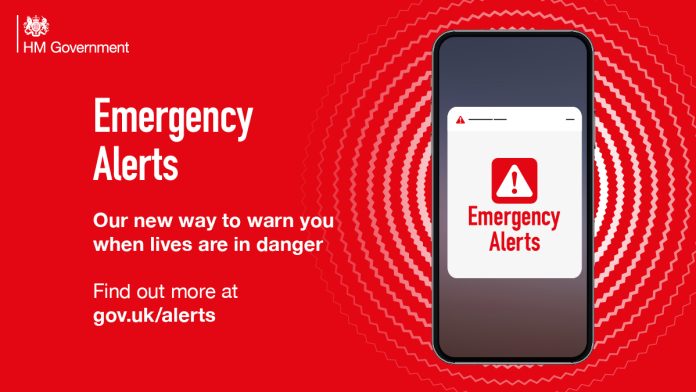A UK wide test of an emergency Alerts service sent to people’s mobile phones will take place on the 23rd April, the Government has announced
The Emergency Alerts system will transform the UK’s warning and informing capability; providing a means to get urgent messages quickly to nearly 90 percent of mobile phones in a defined area; providing clear instructions about how best to respond.
The system is now ready to be tested across the country following successful tests in East Suffolk and Reading, as the Government continues to strengthen its resilience capability, making sure it offers the best possible protection against an ever-evolving range of threats.
The alerts will only ever come from the Government or emergency services, and they will issue a warning, always include the details of the area impacted, and provide instructions about how best to respond –
Emergency Alerts will be used very rarely – only being sent where there is an immediate risk to people’s lives – so people may not receive an alert for months, or even years.
The service has already been used successfully in a number of other countries, including the US, Canada, the Netherlands and Japan, where it has been widely credited with saving lives, for example, during severe weather events. In the UK, alerts could be used to tell residents of villages being encroached by wildfires, or of severe flooding.
Announcing the launch of the new alerts system, Chancellor of the Duchy of Lancaster, Oliver Dowden MP, said:
We are strengthening our national resilience with a new emergency alerts system, to deal with a wide range of threats – from flooding to wild fires.
It will revolutionise our ability to warn and inform people who are in immediate danger, and help us keep people safe. As we’ve seen in the U.S. and elsewhere, the buzz of a phone can save a life.
Emergency Alerts will be used across England, Scotland, Wales and Northern Ireland, and their initial use will focus on the most serious severe weather-related incidents, including severe flooding in England. The Government has been working closely with a range of stakeholders and partners across the UK on developing the system, including colleagues from the emergency services, transport groups and the Environment Agency.







